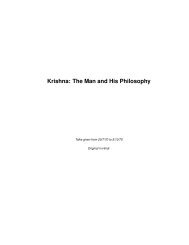Hyakujo: The Everest of Zen, with Basho's Haikus - Oshorajneesh.com
Hyakujo: The Everest of Zen, with Basho's Haikus - Oshorajneesh.com
Hyakujo: The Everest of Zen, with Basho's Haikus - Oshorajneesh.com
You also want an ePaper? Increase the reach of your titles
YUMPU automatically turns print PDFs into web optimized ePapers that Google loves.
CHAPTER 4. LIE DOWN AND WITNESSYou are the buddha, but the Buddhist traditional mind will not even accept an umbrella in Buddha’shand. Even while it is raining, the poor fellow has to sit <strong>with</strong>out an umbrella. Who has ever heard<strong>of</strong> Buddha having an umbrella? But my approach to the buddha is closer to the approach <strong>of</strong> <strong>Zen</strong>,not the Ceylonese or the Burmese Buddhism. <strong>The</strong> Burmese, the Ceylonese and the Tibetans aremore Hinduized. <strong>The</strong> people who took Buddhism to Burma were traditional orthodox people. And thewoman emperor, Ashoka’s daughter, Sangamitra, who took Buddhism to Ceylon was as orthodox asher father. From its very beginnings Tibetan Buddhism has remained attached to Indian Buddhism.<strong>Zen</strong> has a speciality; in fact, it should not be called Buddhism. Although it is the very essentialmessage <strong>of</strong> Buddha, it originated <strong>with</strong> Mahakashyapa’s laughter. <strong>Zen</strong> considers Mahakashyapa tobe their founder, not Buddha. Buddha is Mahakashyapa’s master, and that is their business.<strong>Zen</strong> considers Mahakashyapa to be its originator. And Bodhidharma was a disciple <strong>of</strong> the linethat followed Mahakashyapa. That line became a little alienated from the orthodox line becausevery individual people, freedom lovers joined <strong>Zen</strong> – all kinds <strong>of</strong> eccentrics, geniuses, not mediocrefellows who just go to the temple to read the sutras and say the prayers. That is being done by everyother religion. <strong>The</strong>ir scriptures may be different, their prayers may be different, their temples may bedifferent, but essentially they are all doing the same thing.<strong>Zen</strong> has broken new ground. Mahakashyapa did the first thing: he laughed. Buddha never laughedin his life. With his laughter starts a new stream <strong>of</strong> more joy, <strong>of</strong> more rejoicing, <strong>of</strong> more dancing, <strong>of</strong>more human beings. And when Bodhidharma took <strong>Zen</strong> to China, it took another turn. It becamemore eccentric, because Bodhidharma was far more eccentric than Mahakashyapa. He was thestrangest fellow, but always to the point. He looked strange. You could not understand him. He wasnot part <strong>of</strong> the <strong>com</strong>mon crowd.So first, Bodhidharma made it a very special dispensation and then it met <strong>with</strong> Taoist mystics. Thisis one <strong>of</strong> the greatest meetings <strong>of</strong> two religions where there was no conflict. <strong>The</strong>y simply understoodeach other’s silence – not even a debate. <strong>The</strong>y looked into each other’s eyes and knew that theywere both in the same space.So <strong>Zen</strong> is a by-product <strong>of</strong> the meeting <strong>of</strong> Buddhism and Taoism. It has a different character fromboth, it is a crossbreed: something <strong>of</strong> Tao that is essential, and something <strong>of</strong> Buddha that is essentialhas created a new phenomenon, <strong>Zen</strong>. And when it reached China, it took a few centuries to be clearthat it was no longer the orthodox Buddhism and no longer the orthodox Taoism, it was somethingnew. Out <strong>of</strong> the meeting <strong>of</strong> those two came a strange flower, and this flower has been carried toJapan, where it blossomed to its ultimate peak.THE MONKS WERE PUZZLED BY THIS REPLY, AND AFTER A SHORT WHILE INQUIREDAGAIN: ”MASTER, WHAT DHARMA DO YOU EXPOUND IN ORDER TO LIBERATE OTHERS?”Surely adequate questions but not in the context <strong>of</strong> <strong>Zen</strong>.HYAKUJO RESPONDED, ”THIS POOR MONK HAS NO DHARMA BY WHICH TO LIBERATEOTHERS.” You should have to understand the beauty <strong>of</strong> these words. THIS POOR MONK... doesnot mean simply that he has no possessions. He is saying, ”I am so poor, that even I am not. Mypoverty is not ordinary poverty. I have lost myself in the cosmos. I am no more.”<strong>Hyakujo</strong>: <strong>The</strong> <strong>Everest</strong> <strong>of</strong> <strong>Zen</strong>, <strong>with</strong> Basho’s <strong>Haikus</strong> 63 Osho
















